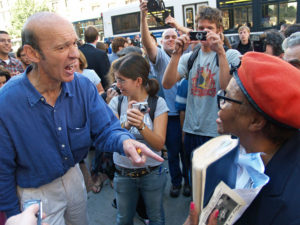 A town in Massachusetts has voted 183-50 to fine citizens who use profanity in public.
A town in Massachusetts has voted 183-50 to fine citizens who use profanity in public.
Residents of Middleborough, Massachusetts voted on Monday to approve a proposal presented by Police Chief Bruce Gates to help curb the use of expletives in the city. While private speech is not effected, those whose engage in loud, potty mouth talk in the downtown or park areas will have to pay a price for their use of foul language.
While profanity was already illegal in Middleborough, police state that they have rarely enforced the ordinance because it did not seem to be significant enough of a crime to spend the time and taxpayer funds pursuing the matter in court. However, Gates’ proposal seemed to be an easier way for officers to hold violators accountable, short of washing their mouths out with soap.
Police officers may now simply issue a ticket for infractions of the ordinance, similar to a traffic ticket. Violators will be forced to pay $20 for each offense.
“I’m really happy about it,” business owner Mimi Duphily told the Associated Press. “I’m sure there’s going to be some fallout, but I think what we did was necessary.”
Duphily explained that profanity in the town is a problem.
“They’ll sit on the bench and yell back and forth to each other with the foulest language. It’s just so inappropriate,” she said.
“These are things that [are] quality of life issues, community policing issues, that a lot of people don’t want to see downtown,” stated Chief Gates.
Local television station WBZ-TV reported that some residents thought the fine was too low, and preferred to see offenders pay upwards of $100 for each ticket.
In nine states, it is illegal to use profanity in public, and many laws stem from statutes that were passed not long after the nation’s founding. The state of Massachusetts also has a blasphemy law on the books, which prohibits the use of the Lord’s name in vain. Pennsylvania, Michigan, Oklahoma, South Carolina and Wyoming all prohibit blasphemy as well.
In 1775, General George Washington signed an order that prohibited profanity among the U.S. military, and many state governors followed suit.
“The General is sorry to be informed that the foolish and wicked practice of profane cursing and swearing, a vice hitherto little known in our American army, is growing into fashion. He hopes that the officers will, by example as well as influence, endeavor to check it and that both they and the men will reflect that we can little hope of the blessing of Heaven on our army if we insult it by our impiety and folly. Added to this it is a vice so mean and low without any temptation that every man of sense and character detests and despises it,” he wrote.
While many are rejoicing over the passage of Middleborough’s vulgarity statute, others speculate that it will be challenged by groups such as the ACLU, who believe that the ban violates the First Amendment.
“The citizens of Middleborough have … [a] right to swear in public,” stated Matthew Segal, legal director of the Massachussetts ACLU. “In fact, some of the town’s citizens have already begun swearing in protest, and they would win a court challenge if the town tried to enforce its bylaw against them.”
Become a Christian News Network Supporter...


